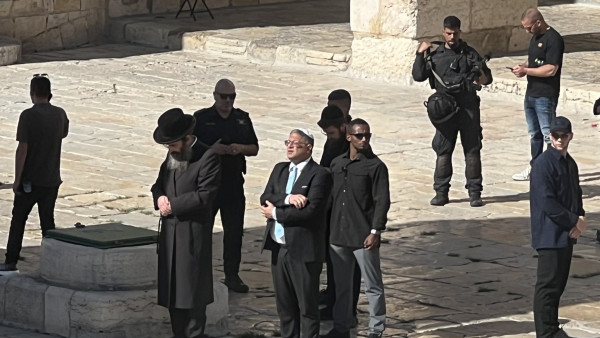The extremist minister had claimed that Jews have the right to pray at Al-Aqsa Mosque, saying that he would build a synagogue at the flashpoint site [Getty]
Two ultra-Orthodox newspapers in Israel have slammed far-right National Security Minister Itamar Ben Gvir for inflammatory remarks about the construction of a synagogue inside the Al-Aqsa Mosque compound, a move that not only attacks Muslim religious rights but also violates a long-standing agreement over the status quo of the holy site.
The Yated Ne’eman newspaper, the official publication of the Degel HaTorah party, ran a front-page headline in the Arabic and Hebrew languages slamming Ben Gvir’s remarks.
The extremist minister had claimed that Jews have the right to pray at Al-Aqsa Mosque and that he would work to build a synagogue at the flashpoint site.
The front-page headline read: “According to all Jewish legal authorities throughout the generations, the ascent of Jews to the Temple Mount (Al-Aqsa Mosque compound) is strictly forbidden, and this ruling has not changed and remains in force. The political pyromaniac is burning the area for the second time”.
It marked the second time the newspaper has taken a critical stance against Ben Gvir’s policies regarding the holy site, according to Israeli daily Haaretz.
In January 2023, the paper called one of the minister’s visits to Al-Aqsa as an “unnecessary and dangerous provocation”, the latest in a series of far-right Israel raids of the holy site, some of them led personally by Ben Gvir.
‘Reckless remarks’
Similarly, the ultra-orthodox Haderech newspaper, affiliated with the Haredi party Shas, led with the front page headline: “Ben-Gvir continues to create provocations and desecrate the holiness of Temple Mount”, referring to the name used by some Jewish people for Al-Aqsa.
In an interview with army radio on Monday, Ben Gvir said: “There won’t be a discriminatory policy at the Temple Mount, you’re allowed to pray.”
The extremist minister claimed that Jews have the right to pray at Al-Aqsa Mosque, saying that he would build a synagogue at the flashpoint site.
It was the first time he had openly spoken about constructing a synagogue within the Al-Aqsa Mosque compound, although he had consistently advocated in recent months for allowing Jewish prayers at the site.
His latest comments came amid ongoing incursions into the compound by illegal Israeli settlers, under the protection of Israeli police who operate under the authority of the far-right minister.
Under the standing arrangements known as the “status quo”, Jewish prayer is banned at the compound, though some Jewish visitors have attempted to pray at the site.
The remarks also triggered a wide backlash inside Israel, with media reports citing cabinet ministers as warning Ben Gvir against harming Israel with “reckless” moves.
Al-Aqsa ‘a red line’
The spokesman for the Palestinian Authority (PA) presidency, Nabil Abu Rudeineh, said that the remarks were “very dangerous” and presented a clear attempt to “drag the region into a religious war that will burn everyone”, news agency Wafa reported.
“The Palestinian people will not accept any tampering with the al-Aqsa, which is a red line that cannot be tampered with at all,” he added.
The Palestinian Ministry of Foreign Affairs also condemned Ben Gvir’s remarks, considering them “an open call to destroy” the Al-Aqsa mosque.
It held the Israeli government fully responsible for the consequences of “the incitement Ben Gvir and his likes practice”.
Various Palestinian factions also condemned Ben Gvir’s statements, with Hamas describing the remarks as a “dangerous announcement”.
Arab condemnation
In a joint statement, Egypt and Jordan called the remarks “a violation of international law and an unacceptable incitement”.
Jordan is the custodian of the Islamic and Christian holy sites in Jerusalem, including the al-Aqsa compound.
Meanwhile, Saudi Arabia expressed its “categorical rejection of these extremist and provocative statements and its denunciation of the continuous provocations of the feelings of Muslims around the world”.
Qatar said the remarks were part of Israeli “attempts to change the historical and legal status of the al-Aqsa mosque”.
The UAE strongly denounced the remarks, urging Israel “to respect the historical and legal status quo in Jerusalem and not to tamper with it”.


